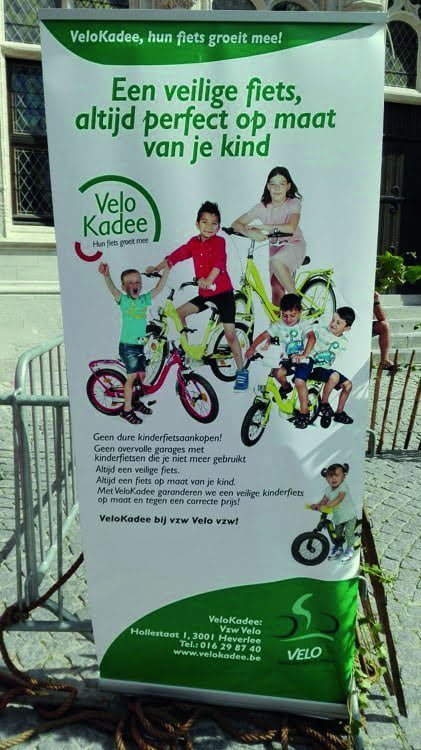Family values
Like many other European cities, Leuven is making use of a number of different mobility-sharing schemes. Beyond the usual car- and bike-sharing systems, the Belgian city is promoting several projects that target children, teenagers and their parents, as Thomas Mourey reports
The city of Leuven – located around 25 kilometers east of the Belgian capital city, Brussels – is most famous for hosting universities and more than 50,000 students. Aside from the students, many families are joining the fastest-growing city in Belgium that now counts over 100,000 inhabitants. With the aim of solving the most pressing local mobility issues, including congestion, the municipality is welcoming the creation of family-friendly mobility-sharing schemes in the urban area.
LEUVEN MAKES PARENTS’ URBAN MOBILITY EASIER
For parents of babies and toddlers, mobility or simply going shopping in cities is not always easy: for car drivers, the buggy must be folded and put in the car and then unfolded every time it is needed; the buggies are often too large to be taken on public transport and cyclists cannot carry buggies on their bikes.
To allow parents to freely visit the city centre with their children without having to park in front of every different destination, a buggy-sharing rental scheme has been installed in Leuven. The ‘Buggy Booker’ system allows parents to use sustainable mobility modes to reach the city centre or to leave their cars at the entrance of the centre for the time of their activities and then book a buggy for the last mile of their trip. The buggies adapt to all ages and have been designed for convenient use on public transport. The municipality of Leuven welcomes the arrival of such a scheme and the installation of rental points in several key cultural, touristic and mobility areas of the town.
Renting the Leuven buggies is free thanks to the scheme being funded via an advertisement on the side of each buggy. The only condition for parents to use the scheme is to book one online at a defined station prior to use.
To complement this buggy-sharing system, the city of Leuven is considering the introduction of a cargo bikesharing system. Located in targeted areas, the cargo bikes would be made available to residents of specific neighbourhoods. This scheme would allow parents to travel more easily by bike in the city with their kids. This would also be an opportunity for them to test and get familiar with this vehicle before purchasing one and, perhaps, avoiding using a (second) car.
There’s no more excuses for parents in Leuven to not use sustainable mobility modes!\
"Children from toddlers to pre- and early-teens are provided with bicycles for only €60 per year as part of the VeloKadée initiative"


BIKE-SHARING FOR ALL AGES
Once children have grown too big for a buggy, it’s time for cycling. There should be no age limit for everyday cycling but finding the appropriate bicycles for children, maintaining and changing them according to the size of children and their often-unexpected growth spurts is often costly and not always simple. This can unfortunately prevent some children from using a bicycle to go to school or for leisure.
To tackle this issue, the municipality of Leuven, in cooperation with the national Lottery, is funding the initiative VeloKadée. In this framework, children from toddlers to pre- and early-teens are provided with bicycles for only €60 per year. Apart from the attractive price, the system has many other benefits.
The main advantage of the scheme is its flexibility. As soon as a child is old enough for a bigger bicycle it can be exchanged for an appropriately sized one. The exchange is included in the annual fee so that it does not create a new cost for the family. The second advantage is the variety of the offer. All bicycles are designed for children and the offer ranges from push-along bikes to bikes with training wheels, to bicycles for 14-year-olds. All bikes are neutral in their design and can suit both girls and boys. Additionally, maintenance is part of the subscription so all bicycles are regularly checked and maintained to ensure the safety and the comfort of young cyclists. This scheme aims at introducing children to cycling and the benefits of it, and hopefully convincing them to become teenage and adult cyclists.
Moreover, the initiative fulfils a social objective as it is designed to be accessible to all households. Parents with the most modest of incomes can get discount on the annual subscription, with fees down to €12 per year. Also the initiative relies on social employment for the maintenance of bicycles and the management of the system.
BICYCLES AT SCHOOL, BICYCLES FOR SCHOOLS!
The third mobility-sharing scheme is implemented directly within secondary schools as bicycles are not provided to individual children, but directly to their schools. The ‘Velo Op School’ initiative, supported by the Flanders Region, has been created especially for the trips made by pupils during their class hours: a visit to a museum or a library; a trip to the swimming pool or the sports hall; or even an excursion to a forest or a nature reserve.
Within the ‘Velo Op School’ initiative, secondary schools purchase fleets of bicycles. An investment of €495 per bicycle is requested. Robust, maintained and gender-neutral bicycles, adapted to the age of pupils are delivered to the schools and during the year bicycles are maintained by workers of Velo which, as a consequence, favours social employment.
Once delivered to the schools, the bicycles are to be used by pupils for the aforementioned type of trips. While these trips are usually made either on foot (for the shortest distances) or by bus, the aim of ‘Velo Op School’ is to replace them with trips by bikes. The benefits are numerous: firstly, cycling is an excellent way for pupils to get some exercise outside of the sports sessions and therefore for maintaining their good health and for fighting against obesity.
By cycling in a group, under the supervision of a teacher, the pupils are also getting more confident with urban cycling and are improving their skills and knowledge about road safety and traffic regulations. Additionally, the teachers can see the difference: compared to walking or riding a bus, cycling is often the most rapid and efficient mode of transport in urban areas. Clawing back valuable chunks of time in the already full school agendas is greatly appreciated by all concerned and the children’s concentration is also improved thanks to cycling.
The municipality supports this initiative greatly as it directly sensitizes the school pupils and their families to the benefits of cycling. The direct effect of replacing bus trips with cycling is also tangible. In Leuven, the operation of two buses has been cancelled thanks to the school bike scheme, representing a major cost-reduction for the school budget and an improvement in local air quality.
As there is no age limit to starting mobility-sharing, there should equally be no age limit to stopping mobilitysharing either. The mobilitysharing offer for the children of Leuven and their families is only a part of the numerous schemes in place in Belgian towns and cities. It is now expected that young mobilitysharers will turn into great users and promoters of the ‘traditional’ mobility sharing schemes of the city.
FYI
Thomas Mourey is Project Manager at Polis
tmourey@polisnetwork.eu
For more information about the City of Leuven’s family-friendly mobility sharing project, contact Tim Asperges, Spatial
Planner and Mobility Advisor Tim.asperges@leuven.be
Buggybooker: www.buggybooker.com
VeloKadée: www.velokadee.be
Velo Op School: www.veloopschool.be
